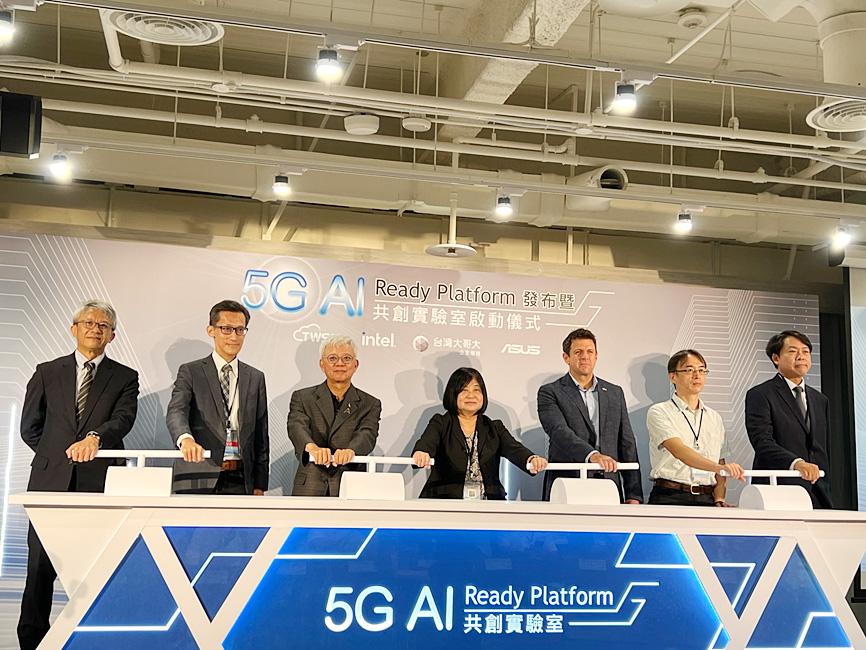Asustek Computer Inc (華碩) yesterday launched its first high-speed artificial intelligence (AI) platform to help 5G application developers accelerate program development and product readiness by adopting Intel Corp’s development tools.
Leveraging the infrastructure and a laboratory built by Asusek for the platform, software vendors would be able to develop and validate their applications easily and reduce the time needed to enter the market, Asustek said.
The platform is to operate on a private 5G network built by Taiwan Mobile Co (台灣大哥大), after the National Communications Commission last month established rules regulating the nation’s 5G private network deployment.

Photo: CNA
The rules would also pave the way for the release of new bandwidth totaling 100 megahertz for 5G private network deployment.
“The platform aims to solve pain points for start-ups, including a lack of strong computing power and high-speed 5G networks,” Asustek chief operating officer Joe Hsieh (謝明傑) told a media briefing in New Taipei City’s Tamsui District (淡水).
With supercomputers installed in the “5G AI Ready Platform,” application developers can save a large amount of time, Heish said.
It takes only four hours to come up with a data analysis model, compared with four months previously, Hsieh said.
About 100 customers are using the platform’s AI feature to develop new applications for different industries, including smart manufacturing, smart cities, smart retail and hospitals, Hsieh said.
Besides, Asustek will not rule out the possibility of investing in the startups using the platform, he said.
He expects the demand for this platform to gain traction next year, or in 2024.
Intel believes its technological capabilities lie not only in hardware, as software-oriented Intel FlexRAN and Intel oneAPI, as well as the OpenVINO toolkit would enable developers to have a common software platform where they can build their solutions, Intel general manager of Asia-Pacific and Japan region Steven Long said.
“This platform is to bring tremendous benefits to users and soft vendors so that they can easily develop, validate and deploy in greater efficiency and readiness,” Long said.
“I believe it will play a crucial role in taking Taiwan’s digital transformation forward,” he said.
Commenting on Intel’s partnerships with Taiwan Semiconductor Manufacturing Co (台積電) and MediaTek Inc (聯發科), Long said the chipmaker has formed multiple-facet partnerships with the companies, which it would expand.
He declined to comment on whether he would visit MediaTek.
MediaTek has announced a foundry partnership with Intel on mature note technology for TV and Wi-Fi chips.
Long said Taiwan is the heart of the electronics industry, as 85 percent of PCs, 90 percent of servers and more than one-third of Internet of Things devices are made in Taiwan.
“My job is to harvest that and grow it across the world at Intel’s scales,” Long said. “If COVID restrictions continue to ease, I’ll be here at least once a month. That’s how important Taiwan is to the region.”

Taiwan’s rapidly aging population is fueling a sharp increase in homes occupied solely by elderly people, a trend that is reshaping the nation’s housing market and social fabric, real-estate brokers said yesterday. About 850,000 residences were occupied by elderly people in the first quarter, including 655,000 that housed only one resident, the Ministry of the Interior said. The figures have nearly doubled from a decade earlier, Great Home Realty Co (大家房屋) said, as people aged 65 and older now make up 20.8 percent of the population. “The so-called silver tsunami represents more than just a demographic shift — it could fundamentally redefine the

The US government on Wednesday sanctioned more than two dozen companies in China, Turkey and the United Arab Emirates, including offshoots of a US chip firm, accusing the businesses of providing illicit support to Iran’s military or proxies. The US Department of Commerce included two subsidiaries of US-based chip distributor Arrow Electronics Inc (艾睿電子) on its so-called entity list published on the federal register for facilitating purchases by Iran’s proxies of US tech. Arrow spokesman John Hourigan said that the subsidiaries have been operating in full compliance with US export control regulations and his company is discussing with the US Bureau of

Businesses across the global semiconductor supply chain are bracing themselves for disruptions from an escalating trade war, after China imposed curbs on rare earth mineral exports and the US responded with additional tariffs and restrictions on software sales to the Asian nation. China’s restrictions, the most targeted move yet to limit supplies of rare earth materials, represent the first major attempt by Beijing to exercise long-arm jurisdiction over foreign companies to target the semiconductor industry, threatening to stall the chips powering the artificial intelligence (AI) boom. They prompted US President Donald Trump on Friday to announce that he would impose an additional

China Airlines Ltd (CAL, 中華航空) said it expects peak season effects in the fourth quarter to continue to boost demand for passenger flights and cargo services, after reporting its second-highest-ever September sales on Monday. The carrier said it posted NT$15.88 billion (US$517 million) in consolidated sales last month, trailing only September last year’s NT$16.01 billion. Last month, CAL generated NT$8.77 billion from its passenger flights and NT$5.37 billion from cargo services, it said. In the first nine months of this year, the carrier posted NT$154.93 billion in cumulative sales, up 2.62 percent from a year earlier, marking the second-highest level for the January-September